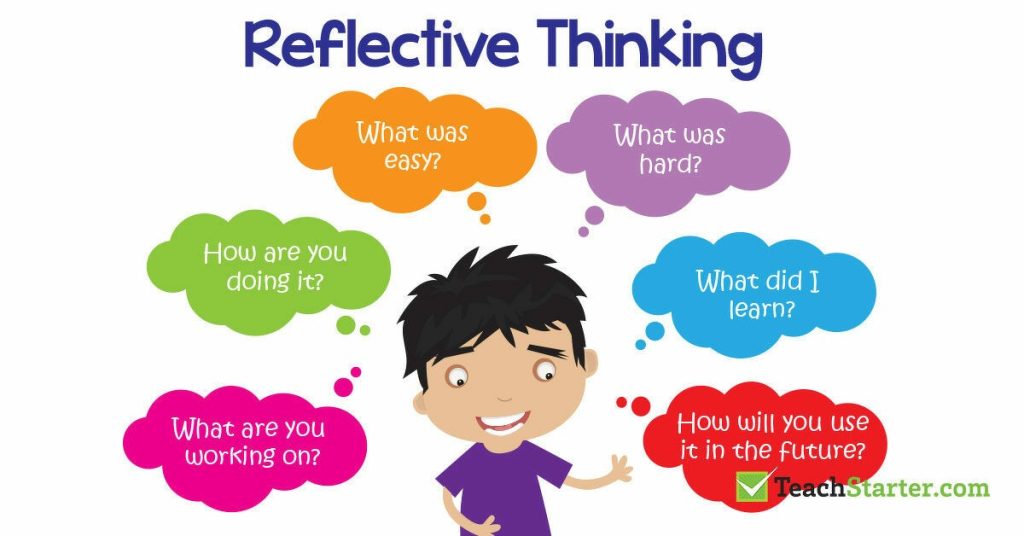What is self-reflection in learning?
It is a cognitive awareness that occurs when students are aware of and can articulate what they know and what they need to learn. Thus, it examines the ways an individual learns.
Self-reflection is a huge and often overlooked part of education. While students are often asked to reflect on their own learning, their teachers typically do not coach them in how to do it most effectively. We already know that teacher reflection is a very important part of our professional development. TESL training usually offers great opportunities to learn how to do that. But students have similar needs. Neither teachers nor students can maximally improve their performance without self-reflection.
When to introduce self-reflection?
I always like to explain and discuss self-reflection at the beginning of the term. I try to cover what it is and why it is important for language learning, so that students see the reasoning behind this. I have found that explicit instruction can be very helpful for motivation purposes. We are aware that work with a clear meaning is an essential component of successful learning for students. But what makes work meaningful? According to self-determination theory (SDT), it must fulfill basic psychological needs, which encompass three distinct psychological satisfactions: autonomy (the sense of choice), competence (the sense of being worthwhile), and relatedness (the sense of belonging).
When to do self-reflection in the classroom?
Give students a chance to evaluate their progress not only at the end of the term but also at the end of each unit they complete, so they can make necessary adjustments to their language-learning journey. To emphasize relatedness (the feeling of belonging and caring), I assign students time to reflect during class. When I walk around, I check to see if anyone needs assistance and to make sure everyone is fine. Reflection is an opportunity for students to think about what they have gained from the learning process. Consequently, I keep coming back to this in varying ways throughout the term. For example, I use motivational quotes such as ‘We do not learn from experience, we learn from reflecting on experience,’ a quote often attributed to John Dewey. If you would like to know more about motivational quotes, please visit my previous post Seven Motivational Quotes for Language Learners.
How to make student self-reflection most effective
As a way to keep students focused on self-reflection, I provide prompts to follow. The complexity of the prompts will depend on the student’s level. Below is one example:

There are numerous additional self-reflection questions you can incorporate. You can also use the KWL (active reading) technique when you are introducing a new topic.
It has been rewarding to observe several encouraging outcomes since I implemented self-reflection in my classes. Let me share them with you.
With self-reflection students can:
- Determine their strengths and weaknesses in skills they have developed
- Analyze their learning process and style
- Learn to be more independent
- Understand how they learn
- Monitor their learning progress
- Set realistic learning goals
- Respond positively to feedback to improve performance
- Take ownership of their own learning
As we can see, self-reflection helps our students in many ways. Moreover, it helps instructors see what their students believe and what they have learned, so they can better assist their students.



6 Comments
Great article!
Thanks, Jiya!
Awesome. It develops students’ autonomy, self-discipline, and self-motivation as well as a substantial level of wothwhileness.
Absolutely, Faryad! Thank you for your input.
Great article, Gönül.
Do you find when a student can honestly self-reflect and self evaluate, they can grade their own work and give themselves an honest mark?
Your idea to provide prompts is a great way to teach them how to self-reflect. We should never assume they know how to look inward.
Keep the articles coming.
Frank
Hello Frank,
Thank you very much for your insightful comment.
A great question! This area definitely needs improvement in many aspects. Some of the Ss I had were pretty honest in their self-reflection and some were not. Ss who are unable to self-reflect honestly are mark-driven (extrinsic motivation, rather than intrinsic motivation). I believe that by explicitly teaching self-reflection we can fix this problem.
Thanks again!